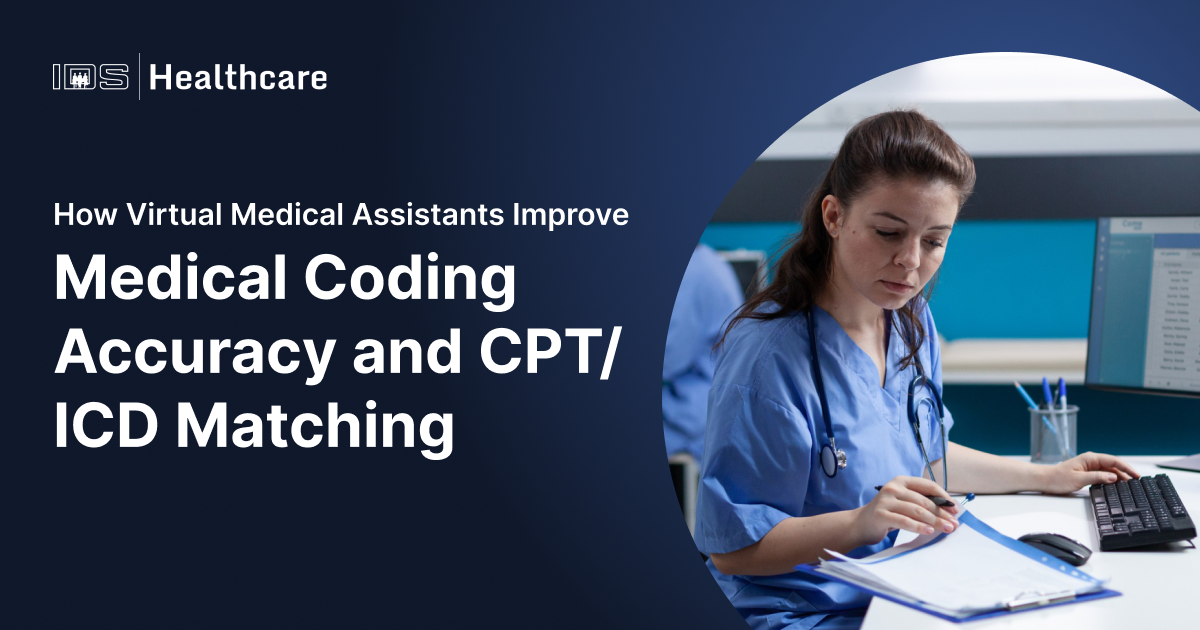Medical coding is one of the more error-prone steps in the healthcare revenue cycle. Mistakes in matching the correct CPT (Current Procedural Terminology) and ICD (International Classification of Diseases) codes can cause claims to get rejected or underpaid. For providers, this leads to revenue loss. For coders, it means wasted time and rework. And for patients, the impact can show up in confusing bills or denied insurance coverage.
Virtual Medical Assistants (VMAs) are changing how coding support is handled. These assistants — often trained professionals working remotely — are proving to be effective at improving accuracy without adding strain on in-house teams. What makes this approach work isn’t simply that it’s remote. It’s how these assistants are integrated into the process and what they’re trained to do.
Let’s walk through what’s working, where VMAs bring the most value, and how they can support better CPT and ICD matching.
Why Do Coding Errors Happen?
Most coding errors happen during or right after the documentation phase. Providers might document in a way that’s inconsistent, unclear, or incomplete. Coders then need to make sense of it and assign codes that meet payer guidelines and reflect the services provided. This mismatch between documentation and codes leads to denials, delays, or downcoding.
Even experienced coders struggle when documentation isn’t standardized. Small errors, like mismatched dates or vague descriptions, can throw off coding decisions. And with guidelines changing frequently, staying updated is another job in itself.
How Virtual Medical Assistants Support Your Healthcare Facility
Virtual medical assistants act as support staff who take on the repetitive, error-prone parts of the process and help reduce the coding burden on your team. Here’s how they add value to your system:
1. Pre-Coding Document Checks
Before a note reaches your coding team, these assistants can review provider documentation for completeness and consistency. They’re trained to spot missing details that include procedure location, duration, or follow-up actions. Also, they can request clarifications in real-time. This saves coders from making assumptions or chasing down providers in later stages.
2. Real-Time CPT and ICD Reference Support
VMAs can reference payer-specific coding guidelines and flag mismatches before claims go out. They’re not assigning final codes but assisting with logic checks. For example, if a procedure code doesn’t align with the diagnosis provided, the VMA flags it for review. This support means coders can focus more on decision-making rather than sorting through documentation or guidelines.
3. Consistency in Recurring Visits
In specialties where patients return for repeated services (examples: physical therapy, oncology, or behavioral health), maintaining consistency across visits matters. VMAs can compare previous coding to current documentation and alert teams to changes or patterns that might impact coding choices. This helps maintain compliance & reduces claim edits from payers.
4. Integration with EHR Workflows
Most VMAs work directly within your implemented EHR systems. They’re trained to use templates, autofill fields, and flag incomplete documentation before it becomes a problem. Because they’re in the system early, they help reduce errors that start at the front-end & ripple into coding.
Benefits of A Virtual Medical Assistant
CPT & ICD Matching Made Easier
One of the ongoing frustrations for coders in healthcare entities is aligning the correct ICD diagnosis code with the CPT procedure code. Many claims fail because the two don’t meet the payer’s requirements for medical necessity. This is where VMAs become helpful as a second set of eyes.
They can use payer rules, linked databases, and internal templates to check if the CPT/ICD combination is allowed. When something looks off, they route it back with a note, saving coders from having to catch every inconsistency manually. While this doesn’t remove the final responsibility from the coding team, it does prevent a lot of small mistakes from slipping through.
Reduced Claim Rework and Denials
A clean claim saves time and money. Every claim that has to be touched more than once cuts into revenue and productivity. By assisting in the early stages, VMAs help improve the “first-pass” rate (the percentage of claims that are accepted on the first submission). This means fewer denials to appeal and fewer backlogs for the billing department.
In practices that have integrated VMAs into their workflow, billing delays have gone down, and coder satisfaction has gone up. Teams aren’t overwhelmed by follow-ups, and the focus shifts to quality rather than constant corrections.
Improved Compliance
VMAs also play a part in helping practices stay audit-ready. They can help maintain audit trails, support documentation consistency, and flag high-risk codes that may trigger payer scrutiny. Their work supports compliance officers and reduces the risk of payer penalties or overpayment demands.
Because VMAs are often trained with compliance in mind, their checklists and templates are aligned with payer audits and CMS guidelines. When coding support is built with compliance from the start, the entire process becomes more stable.
Are Virtual Medical Assistants Necessary for Every Practice?
If a practice struggles with repeated coding errors, slow claim processing, or constant back-and-forth between coders and providers, a VMA can surely help.
It’s not about replacing staff. It’s about supporting them with an extra set of trained eyes who focus on consistency, accuracy, and process stability. Most practices start by assigning VMAs to a specific set of tasks & expand their role over time as trust builds.
Final Thoughts
Medical coding will always need a trained, experienced human touch. But that doesn’t mean your coding team has to do it all on their own. When Virtual Medical Assistants are brought in to support the process — from checking documents to helping match codes — the results are clear: fewer errors, faster claims, and better outcomes for your practice and your patients.
Considering expert Virtual Medical Assistants for your facility? Connect with IDS Healthcare experts for a seamless experience.

